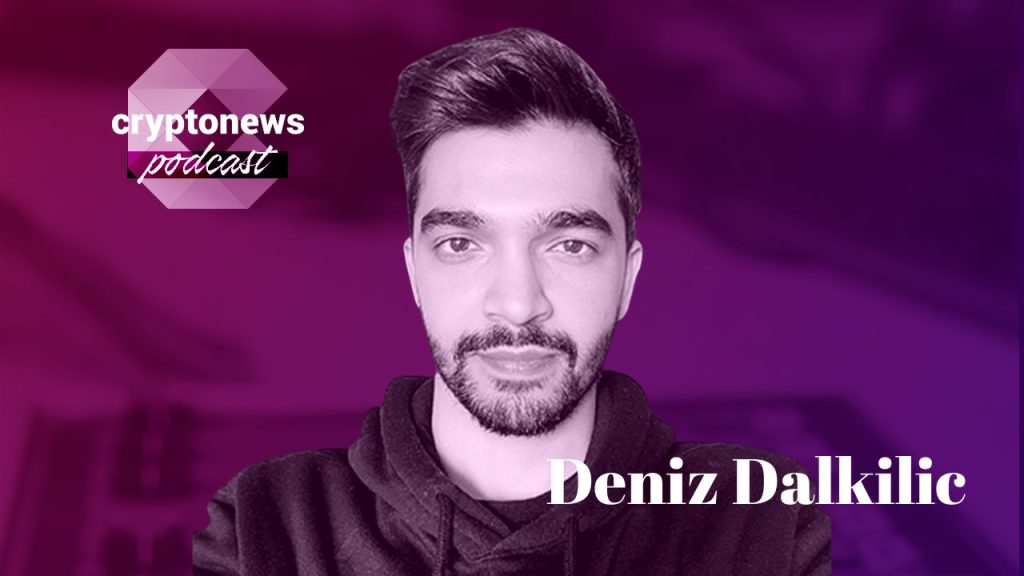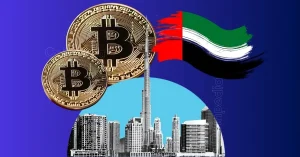Deniz Dalkilic, CTO of MRHB, on Halal Defi, Tokenizing Commodities, and Decentralizing Cloud Computing

In an exclusive interview with cryptonews.com, Deniz Dalkilic, CTO of MRHB & Co-Founder of Paribus, talks about decentralizing cloud computing for the Web3 industry, the challenges of building a Halal DeFi platform, and decentralized philanthropy.
About Deniz Dalkilic
Deniz Dalkilic is the CTO of MRHB and Co-Founder of Paribus.
Deniz has a Master of Science in Computer Software Engineering from the City University of London and a strong software development career for over ten years. Scouted by Tottenham Hotspur FC at 13, Deniz was actively involved in football until interrupted by certain health issues, whereupon he decided to pursue software engineering instead.
Deniz worked in the Web2 world with startups and large corporations – he was the Engineering Lead at Vodafone and the Senior Software Engineer at Thomson Reuters as well as the Software Engineer Lead at Capgemini, where he developed software solutions for clients including Royal Mail, Pole Star Space Applications and Lloyd’s Register.
In 2018, Deniz ventured into the blockchain space and has since co-founded two Web3 companies: decentralized bounty management platform BountyOx, where he was CTO for two years until 2020, and Paribus in 2021, a Cardano-powered cross-chain borrowing and lending protocol for NFTs, liquidity positions, synthetics, and yield-bearing assets.
In the latter half of 2021, Deniz joined MRHB DeFi as the Chief Technology Officer, where he is in charge of the company’s product and architecture development.
Deniz Dalkilic gave a wide-ranging exclusive interview which you can see below, and we are happy for you to use it for publication provided there is a credit to www.cryptonews.com.
Highlights Of The Interview
Decentralizing cloud computing for the Web3 industryBenefits of tokenizing commodities, such as gold and silver, and why it is a killer use-case for DeFiThe challenges of building a Halal DeFi platformBuilding EmplifAI, the first Halal liquidity harvester, and MIRO, the first Halal staking platform Decentralized philanthropy (an upcoming MRHB DeFi product)



Full Transcript Of The Interview
Matt Zahab Ladies and gentlemen, welcome back to the Cryptonews Podcast. We are buzzing as always. Today’s guest is coming in hot from the one and only London, England we’d love to see it today we have Deniz Dalkilic on the pod, the CTO of MRHB pronounced Marhaba, which means welcome in Arabic, that is MRHB DeFi. He’s also the Co-Founder of Paribus. Deniz has a Master of Science in Computer Software Engineering from the City University of London and has had a strong career in software dev for the last 10 years. He was actually scouted by Tottenham Hotspur at the age of 13, which we will definitely get into because that is cool as hell. Deniz is working Web2 for a hot minute working out incredible companies like Vodafone and Thomson Reuters. In 2018 he jumped into Blockchain and his Co-Founded two companies, one being BountyOx where he was the CTO until 2022, and Paribus in 2021. In the later half of 2021, Deniz joined MHRB DeFi as the Chief Technology Officer where he is now in charge of the company’s product and architecture development, super pumped to have you on Deniz, welcome to the show my friend.
Deniz Dalkilic Thanks for having me. That was a pretty comprehensive introduction.
Matt Zahab Had tried had there was a hell of a lot more I’m not gonna lie, but I tried to start of condense it and go from there. Deniz, I’m a big I wouldn’t say big but I’m you know as a Canadian, there’s not a whole lot of Canadians without sort of European heritage that truly have a crazy love and affinity for European Football, which you know be called soccer across the pond. Last couple of years are sort of getting into it. I don’t have a team yet. I don’t really want to be a bandwagon here. I used to love watching Liverpool back when you know a couple years ago when Salah was tearing it up, I just felt their style of football was very beautiful, obviously Barcia around Madrid. PSG with those three guys up front is a treat, but still don’t have a team. We’ll get into that later. But I’d love to start with you being scouted by Tottenham at the age of 13. What the heck is that like? I want to hear every little detail this story. I’ve heard some crazy stories about the Academy for all these world class, you know Premier League teams how did that all happen? How did it all go down?
Deniz Dalkilic Yeah, so I’ve been playing football since I was probably six. So it’s been a stall the journey, just continuous throughout my life. I mean, I still played football, but obviously not professional level. So yeah since six I was playing and then I was part of this small community club within North London, which is why the city grew up, man, I still reside in northeast London, and from that smoking Music Club, they usually have like scouts coming down from different clubs within the UK, especially within London area, you know watch the games and then they will like point out few kids who they’re interested in. So that’s basically how it came to be. It was one of these playoff games, I think it was a tournament game that we’re playing when I was 13. In an 11 aside tournament that we had, for a made up cup obviously didn’t mean anything. But you know, when you’re that deep into the hole, everything means everything with to try to win that trophy. So I played attacking mid, and that basically during that game I had a good game to be honest. The ego picked up so they were inquiries and then I went into a few training sessions with the whole club skeleton system. But it was going really well, and it looked like it was going to become a full pledged thing, and then I turned out I was I had an asthma problem. So we kind of shut down this dream of becoming a football player because I was just not physically able to have the stamina that was required. Especially I mean if you watch Premier League, you know how I find intense it could become, it’s sort of up and down. So because of that physical condition, they had to drop me which was of course devastating at the time as a 13 year old you know, it’s like your whole world comes crashing down you work so hard. But when you have family around, they always somehow support you they find a way to solve, see things differently. It was quite difficult couple of few years. But eventually I then moved on to from sports to completely different irrelevant place, which is where computers and so programming came into fate. I started coding about 15 years old, and since then I’ve been chasing this technology pursuit. So that’s basically my background and brief story.
Matt Zahab Sorry to hear about the asthma but that is a pretty darn cool story and quite an intriguing one as well, you rarely hear of the sort of switch from athletics to like, very sought after discipline like computer science, like normally it’s like coming from someone like myself, it’s like athletics to sales or marketing, right? Where you can sort of take some of those team building skills and tenacity that you learned on the pitch or whatever sport used to play and bring that into, you know some type of environment that’d be the go getter, and I’m not saying that computer science doesn’t have that mentality. But it’s usually you know, it’s a bit of one V, it’s a singular game, you’re playing against yourself, right? Whereas in sales, you’re sort of going against another person. I always find that interesting. Going back to Tottenham for a second. When you’re at the academy, did you play with any, you know players who just popped off? And are world class players at the moment?
Deniz Dalkilic Yeah, I did. I mean, there was a few guys that basically made it to the top league, which is the Premier League, of course. So basically, we’ll name about five or six different guys from that era. I forgot their names now, but it’s been such a long time. But yeah, there’s a few names I have to look up the names, I do actually follow their football quite a bit. But most of them are coming to a stage where this will fade in or hinder career because of the age of course. But yeah, there was a few guys that made within that little Gallatin system that we were picked out with from.
Matt Zahab Why get into computer science? Like why coding of all things after you knew your football career was done?
Deniz Dalkilic First, I always asked myself the same question. I don’t know, it was quite a drastic change. Because I was always interested in sort of gaming and technology and gadgets, etc. But it was never a sort of intriguing matter for me where I would ask myself, how does it work behind the scenes, but then I guess maybe the whole concept around, you know the whole process around me not being scouted and not being able to follow that dream, kind of put me back into this shell, right. So I was upset for a couple of years, I didn’t really want to do much, because everything had failed for me. So I saw turned towards computers and so like, I started reading a bit more thought and gaining as I read more and more. So I guess it was like a blessing in disguise that I didn’t get picked. Because I was able to absorb look elsewhere, which is completely irrelevant, and once you get into computer, I think it’s mentally and intellectually challenging. So it keeps a go it you know, you want to do something even if there is a solution for something that’s out there, you could possibly rewrite the entire solution in a different manner that will be like okay, look this is more efficient. So that kind of approach and that kind of process pushed me more and more down the rabbit hole, and eventually became a thing for me where I would actually enjoy sitting for hours and reading about different programming languages, how things work behind the scenes, TCP IP, base level stuff, and then of course once you know that, then you actually start wanted to build something on top of all this technology and that’s sort of how we became an avalanche and became what is today.
Matt Zahab Great story there. You tore it up at some pretty darn reputable Web2 companies as well. I mean, Thomson Reuters, Huge, Vodafone, Massive, Royal Mail, Pole Star Alliance, Lloyds. Like just big stuff and then you left for Web3, I always ask this to my guests, because I find so intriguing when it’s not like you start your company, and you know, you weren’t climbing the ranks, and you didn’t have a cushy job. But you had all these things I feel like and again, I’m just throwing a dart here. But I feel like you had a lot of the things that you wanted, and still jumped to Web3, which always intrigues the hell out of me. So I got asked why the jump to Web3 a couple years ago, and walk them through that whole decision making process. Was there a specific aha moment where you were like, screw it It’s got to happen. How did that all go down?
Deniz Dalkilic Yeah. So when I first met Blockchain, I was it was actually quite late, and the way it came about is they had an internal project where they were using Hyperledger to permissioned Blockchain to basically create this alliance of node operators, which are basically banks at the time, and they wanted to track their mortgage incomes and losses within this private ledger. Then I got really intrigued by the whole concept so I was like, how are these people sharing data without any sort of compromise, etc., and you hope you went down the rabbit hole of like distributed ledger’s and decentralized systems, and then of course, the golden standard which is in my opinion as always, Bitcoin and its proof of work Consensus mechanism. So once you start to read about those, it sparked something in my mind where I was like this must be the future because a centralized future is not appealing to the masses. But the decentralized future does appeal to the masses in the idea that you could control your identity and data you could, you can just plug into these systems and become part of it, build something on top of it. Without having to go through the bureaucracy of corporates and centralized systems. It became very intriguing at a sort of philosophical level, but then when you go down to the technical level, it became even more intriguing because every line of code is at least let’s take this EVM side, because that’s how it basically came across Blockchain. Every line of code that you write in solidity can have negative and positive consequences in terms of gas cost, execution speed, and how the whole thing works. Whereas when you look at the centralized systems, there is no such concept. I mean you could write garbage code, yes they will not perform as you wish it would be is no performance. But it’s not a matter of where people are paying more to execute your code. So this whole concept of writing good code, to actually get people to use a code in efficient manner. It killed me quite a bit. So I wanted to do more and more and make it as gas efficient as possible, and since then, of course the Web3 world is massive you have DeFi, NFTs, you have decentralized identities now in with technology coming in. It’s just a growing, intriguing feeling where you want to see the what’s the next thing that’s going to come on, what’s the next thing that’s going on? Because I believe to a certain point, centralized systems of course they’re great, you know they enable us to even interact like this right now. But in 10 years, 20 years time, do I see centralization as being the main backbone of the internet? Probably not, and that question is the question that I asked myself before, I was like well, this is a risk I’m gonna take, I have a good job, and I did have a family, I still have a family. It was with a newborn actually, when I joined the Web3 space. So it was a big risk. But I asked myself the question, and the answer was quite apparent to me. So I took the leap of faith, I took the risk, and finally things worked out, and now I’m able to write code that I enjoy writing code, and the code I write, the way I see it, it’s public good. It doesn’t belong to me just because I wrote it. So it’s there, anyone can benefit from it. That’s basically my backstory on going into Web3.
Matt Zahab That’s again, Deniz you’re on a roll here. It’s crazy to think about, but it’s one of the sort of commonalities by a lot of the people who had really good jobs at Web2 companies decided to join Web3, because they understood that the technology was going to be the future, and they didn’t really want to be left behind. Right, they sort of wanted to be a pioneer in the new industry, similar to people a little bit older than us had opportunities back in the early 2000s. With you know, Web 2.0. I guess that was Web 1.0 at the time, but the dot com era is, as most people call it. Let’s jump in your new company. Let’s start out with MRHB I just before we get into that one of the points that you’re very passionate about is decentralizing cloud computing for the Web3 industry and the multitudes of advantages that come with that, compared to centralized options like the AWS, Microsoft Azure, or Google Cloud. There’s some crazy stat, I always forget the exact number. But it’s something like 95% of all cloud computing on the internet runs on those three platforms, which is like pretty crazy to think about where you don’t if those three switches went out, the internet would be gone, and if the internet’s gone, like that’s probably a shoe in for World War 3 crazy to think but walk me through your thesis on why decentralizing cloud computing so paramount to succeed, and to success in the Web3 industry.
Deniz Dalkilic The basic is what you basically just said, there’s too much power in the hands of very few companies. It’s just this power is not all solely running applications on the internet, but actual data collection, data processing and how that data is used. These corporates have become what they are, because there is demand for the services, and if there is demand for the services, you ask the question, Well, where can I call to get the service and if you have limited number of options, then inevitably you’re going to end up with them as well. So that Monopoly has to be broken down. That’s my top priority and top belief into why I became a part of the Web3 and why I developed the projects down development. We have to break the monopoly apart, and it’s a must because as you mentioned, I think we actually had the small glips of a blackout with Cloudflare for example, where they control a large percentage of the DNS and the return of the traffic etc. Where the Cloudflare went down, I think three four months ago and a lot of work websites were unreachable. This shows the danger that we have an a decentralization there’s and as a software engineer, we’re always educated and taught that there should always be a backup of a backup, and if the backup of a backup is not there, and main system goes down, then we have chaos made chaos is obviously, it’s not about just losing money. Today the internet is involved in from health care, to emergency services, to whatever you can think of Internet has a part to play in it. So if this backbone goes down, or if it’s censored, to be in line with certain groups or certain individuals views, then we basically go against what we have built, which is you know we all love the democracy, we love freedom of speech. But when you look at the reality, the infrastructure that we have built, contradicts exactly what we like about where the places that we live in. With all day in mind, I think it’s crucial that we decentralized the future, and we decentralize the computation power, and we share some of the computation resources that we have to be able to reach the entire globe. Because right now, if you look at certain third world countries, they don’t have what the western nations have, right? And the only reason why they don’t have it is because they have limited financials, they have limited access to the internet itself. So we need to find a way to share the wealth within the western world with the rest of the world so that everyone could be on the same level, and once we’re in the same level, I think that’s when you get really creative minds working towards a common goal, which is for the common good of the human race.
Matt Zahab Well said and honestly, that’s a great segue to another point that I wanted to ask you about, and that’s the benefits of tokenizing commodities, right? People who don’t live in the western world, or Europe or the wealthier parts of Asia, obviously, you can throw Australia in there as well. But it’s very difficult for them to have access to financial instruments that allowed them to create, you know not even really wealth just earn some type of passive income, right? And one of the best parts about Crypto and DeFi is that we have the opportunity to tokenize a shitload of commodities, gold, silver, and this is a massively killer use case for DeFi, and I know you and the team at MRHB are grinding on this, and heck, this should come out pretty darn soon. I’d love if you could take a deep dive into this point and talk about the importance of this.
Deniz Dalkilic We actually released this product. So it’s actually live right now it’s within the Sahal Wallet. So Sahal Wallet is the noncustodial wallet of the MRHB network, and within it we have integrated what we call TijarX, which is basically tokenize commodities exchange. So we partnered with an Australian Gold Bullion, they called ABC, they’ve been around for 80 90 years now. They hold the physical gold and physical silver within the vaults, which is preserved, and then they tokenize it based on today’s gold price. So one gram of gold, I think it’s worth like $60 at the moment, and US dollars. So that would be the equivalent in token, and we put this on chain and now it’s basically permission to straighten, and we have even gone one step further and we’ve got Ainslie to implement proof of reserve, which is from chaining speeches, to make sure that the gold is genuinely there, and it’s been kept in a vault, it’s not being reused by another venture, and in fact the gold the tokens that you buy all the TijarX are actually redeemable to physical gold, they will deliver it to your house wherever you are of course subject to you know, taxes, etc, which is not ideal. If you want to quick access to.
Matt Zahab That’s crazy.
Deniz Dalkilic Yeah, it’s pretty insane. So if you want access to the cash, you could of course sell for USDT instantly within that. But if you want actual physical gold, you can demand this and you will be redeemed within 14 days. I think this is crucial, and I think this is the first step of real world assets coming on chain, and this is a trend that we’re seeing. So I believe tokenization is important because we want to be able to tokenize minerals and commodities and metals, precious metals that may be present in let’s say Congo, but they’re not able to export it, and they’re not able to, let’s say produce, send it to the world. But if they can come on to a solution like TijarX and quickly tokenize the precious metals or minerals and start acquiring liquidity for it, then of course this opens door for more development within that nation. It opens the doors out for people to actually get involved with Web3 to say look it’s not all about Cryptocurrencies and volatile markets if you want there are safe havens within the Crypto world as well, which attracts more when we’re more users to the Web3 which is I mean eventually that’s our end game as Crypto people to onboard more people into the Web3 space. So I think it’s a good milestone on that end goal, and I think it’s crucial for developing nations especially to be able to leverage this technology to maximize the development within the nation’s.
Matt Zahab Deniz we’re gonna take a quick break and give a massive shout out to our sponsor the show and when we get back we are going to jump into Halal DeFi which is something that I am so friggin interested about never heard of until you and the team that made this happen, and we’re gonna get into this in a minute as to begin gotta give a huge shout out to our sponsor of the show, and that is PrimeXBT the team at Cryptonews loves PrimeXBT, as they offer a robust trading system for both beginners and professional traders. It doesn’t matter if you’re a rookie or a vet, you can easily design and customize your layouts and widgets to best fit your trading style. PrimeXBT is also running an exclusive promo for listeners of the Cryptonews Podcast after making your first deposit 50% of that first deposit will be credited to your account as a bonus that can be used as additional collateral to open positions. The promo code is CRYPTONEWS50 and that’s CRYPTONEWS50 to take advantage of this offer and receive 50% of your deposit credited to your trading account now back to the show with Deniz. Deniz when I was doing research for this the topic that got me going the most was Halal DeFi I was absolutely blown when I came across this I’m not going to try to jump into this because you are literally the guru and master of this there is actually a crazy need for this as well, and we got to get into it walk me through Halal DeFi what exactly is it why it is important tell me about the challenges of building a Halal DeFi platform but the floor is yours. Let’s get right into Halal DeFi
Deniz Dalkilic So Halal DeFi I mean it could be termed as Ethical DeFi as well, because it aims to be sustainable. So it is built on the foundations of Islamic finance, obviously fenced and dictated by certain rules within Sharia, which is the Islamic Law. When you say Sharia there is a prejudice. That issue is all about you know, x y z. But Sharia has positive concepts, especially across finance and how individuals should interact and exchange with one another. So, the main thing to understand before I mean rather than going deep down the rabbit hole, Sharia because there are experts does will discuss in this day in day out. But the main concept is it needs to be clean of interest. So that means there is no interest involved within the system of this Halal DeFi or Islamic finance. So what we looked at is Islamic finance before we started the project, and we realized this is my personal opinion. But I realized that Islamic financial or Islamic banks tend to replicate the high street banks or the usual banks that were used to and their loans model and the interest model, but they sort of sugarcoat it and say it’s not the interest, it’s something else. But when you look at how it works, its interest. So it’s very hard to go against that in the traditional Web2 financial space. Because it’s set in stone, there is a foundation FinTech exists today, FinTech existed 100 years ago, at least the concepts around it, and so the whole mechanism of how money flows in and out is set in stone, which is just basically interest driven. What we’re pre allows us to do is actually look at how money is generated. Look at how the traditional world handles money, and actually give us a chance to rewrite some of it because it’s a brand new world DeFi is a brand new world, the whole concept of DeFi composability the whole concept of it’s open and permissionless is not controlled by a single entities central entity. So therefore, you don’t have to go through 20 loops to get to a result. If you have an idea that you believe is great combined with of course subject to reviews from Sharia experts, then you could write the code executed and see how it behaves in the real DeFi world. So this is a sort of a paradigm shift for us because we’re able to actually rethink the entire thing and actually genuinely create Islamic finance products that adhere to the Sharia rulings and not just sugarcoat things. For example, when you lend money in Islamic in Sharia, you’re not permissioned to make usually which is high interest rates etc. If you are lending the money, then you’re basically taking on a risk of not being repaid, and you can make an upfront contract, where you say okay, I will give you, let’s say 100 but with certain fees, it will be 110 back in X amount of time. But you can’t exploit that contract and start increasing your interest rates and etc., whether it will put the opposite counterparty in a difficult position where they will continuously grow debt, and this just continuously grows out spirals out of control, which is in my opinion, what’s happened with the traditional banking system, because it’s so fractionalized, it’s so interest driven, it’s just growing debt to debt, and then we’re basically in this massive hole where the debt is unpayable. It’s just not going to be painful. We basically set up certain systems to allow for this two way interaction between individuals, we set up systems to allow individuals to invest within the DeFi as a whole, but stay away from those interest bearing protocols, and we find ways to generate income for our end users between 5 to 15% per year, while making sure everything is Sharia compliant, in that there is no interest. There is no illegal activity like gambling, or nudity, or pornography, or blackmail, all that stuff. So it’s all ethically sustainably returns that you make and we do not put anyone in depths that they could never come out. That’s essentially what ethical allowed for DeFi is just a layer on top of exists DeFi to filter out some interest bearing protocols.
Matt Zahab I mean, I love that. So just like you said, Halal can almost be subbed out for ethical, like it’s really those words are synchronous.
Deniz Dalkilic Yep. Exactly.
Matt Zahab Gotcha. So when it comes to building a platform like that, there must be tons of challenges, because normally like, you know interest in different spreads, and safety barriers, those are all worked into the algo, right? To save the actual market maker like you guys. But when you’re doing it this way, like you spoke about I guess you in the team really are taking on like a shitload of risk, right? Because you have these ethical and perhaps fair contracts than traditional finance, and more specifically, the current DeFi model. Am I on the right track there?
Deniz Dalkilic Yeah, I mean we tried to minimize our risks, because we are just essentially a facilitator between two parties. So as long as we can get both the parties enough context and detail into what they get into it’s basically down to the individuals if they want to pursue that venture.
Matt Zahab Interesting. Another thing you guys built is EmplifAI, which is like EmplifAI, which is the first Halal liquidity harvester, and the first Halal speaking platform. I mean, I’m wondering research for this, I read a bunch that I didn’t know before, and there are some, perhaps weird as the wrong word but just uncommon for someone like me lives in the Western world, a bunch of different passive wealth generation methods from a Halal point of view, and also a house staking work from a Halal point of view and the challenges in achieving this and I’d love if you could talk about both these points, because, again, for someone like me this is such a foreign concept.
Deniz Dalkilic So EmplifAI is essentially a liquidity harvesting tool, we allow individuals to drop in, whether that’s a stable coin or ETH for etc, into these polls, and we take those from the vault and distributed across the DeFi space, but we only distributed across DeFi space to protocols that are not interest bearing. So we would for example, not deposit the funds into Avi even though Avi potentially give us a better return. It’s not Sharia compliant because of its interest fundamentals. So we will take this and distributed across different chains, we integrated with six chains at the moment, and about 10 different DeXs that we’re going to be integrated with, and within those DeXs we continues to check for which are the most lucrative polls, and then we deposit the funds. Once we deposit the funds of course, we have to watch out for things like ETH more liquidity enters that pool, then API drops naturally. So we continues to keep track of all investments which we make on behalf of the which we distribute on behalf of the users. But to mention this is all non custodial. So you can pull out at any time you want. We basically give you hints as to where you should probably move, but the move is actually down to you. So we don’t take control your times at any point. Yeah we moved the funds across the spaces. We he’d make suggestions based on our working and data consumption and we’re able to generate 5 to 15%, based on our back testing and our plans, while keeping Sharia compliant, which is quite unique, because not a lot of protocols can promise such thing because it’s quite complex, and I’ll be honest, writing the code took us about six months discussing, the whole thing took us about nine months, because we have to go through Sharia. So the way internally we work is we will come up with an idea as engineering teams, they EmplifAI and we’ll write up the document in detail how it’s going to work, where the money is going to go, where the run is going to come from, and how what’s your fee structure etc., and we will present this to the Sharia governance board that we have, which has three members at the moment. These are actual scholars within Islamic schools, and they specialize in Islamic finance in general Cryptocurrencies, and of course Sharia itself, and they read this document, they review it between them, they will come up with a bunch of questions, and these questions will be the point of discussion from their own, which was the last product that we built, it took us nine nodes, and it took us nine months, because we have to explain, and we have to make sure each member understands the exact flow of funds, because obviously to make that decision, whether it’s direct compliant or not, is a big ask on the scholars itself, it’s not an easy task to just say, you know it’s strict compliantly, especially if you’re a practicing Muslim, then you have a certain level of responsibility that you need to stick to, you can’t just be like this to recompile, the brush holder you have to know each and every single detail. So this is why the discussions take time we sometimes have to restructure and re change everything which we have a couple of times internally, before we get into a final decision, and it’s the same product, we basically follow across all our products. An engineering team comes out an idea goes through a document, document gets reviewed by Sharia team, discussion, and then eventually, a final blueprint of the product and then we start to fully start coding was the whole engineering team.
Matt Zahab That’s crazy. What a process man Oh, man. Deniz you’ve been on fire today man, I know we’re getting a little tight for time. One last topic that I really want to get into is decentralized philanthropy, which is actually an upcoming MRHB DeFi product. I know one of the sort of recurring themes of the pod has been everything Halal, and Muslim related, and you can speak to this very well the importance of philanthropy for Muslims, and sort of a segue would be if you could get into the advantages of decentralized philanthropy platform, as opposed to traditional methods of giving to charity, I’d love if you could go for a nice buzz on these topics.
Deniz Dalkilic So that side of the charity, or the product is quite important to us. I mean, it although Marable might seem like a very Muslim focused Manchuria focused platform, in essence, as I mentioned earlier, so it’s just an ethical platform that sort of ticks, the boxes that Muslims are looking for to enter Crypto space. Our end goal is always to onboard users into Web3 whether this is free ethical finance, whether this is for another project, whether this is through something else, such as accountant obstruction, etc. End goal is always to same. We need more users, we need more adoption. So when you think about the number of Muslims across the globe is rushing, there’s like 1.6 billion now, and that’s essentially quarter of the population, if we can get 1% of that Islamic crime and so 1.6 billion people, and then that equates to $3 trillion globally, within his own requirements, if we can get 1% of their $3 trillion dollars. This is a huge milestone for us, in terms of number of users in terms of number of amount of TBL, that could be locked up within word three protocols, not necessarily invariable, but essentially, if we can give them a way to enter the space without any confusion and take away all the complexities, then we have already won, because that’s our end goal. So one of those ways to get them into the platform and actually start using it day to day throughout their life, not just to invest is to offer charity platforms, such as a product that we’re building. So there is a concept within the Islamic religion is called Zakat you pay this once a year. It’s essentially like a charity given you have to give, I think it was 2% of your wealth, and once per year to the people who need regardless of who they are, where they are. It doesn’t matter you but you have to give this money. It’s part of the main pillars of Islam. So if we can build up product where we directly integrate with charities, and everything is transparent by default because of Blockchain nature, and you see your money flowing from your wallet to the charities wallet, and then from there, the child could of course, we bring in more integration with Blockchain to see how they actually spend those funds, then it streamlines the whole process because right now, a lot of people in Crypto for example, if you are in Crypto right now and you want to play Zakat, you have the off ramp it you have to change this to Fiat and when you Fiat it, it’s subject to tax and capital gains tax etc., and sometimes you just really don’t want to touch Fiat but there is no other option right so if we can provide this charity work where we can integrate with charities all across the globe, and start actually genuinely helping people, then that’s a level the box that we have taken into the day to day lives of these people who want to use Web3 for the betterment of everyone. So this is quite important to us we are trying to reach out to many charities and when I say charities I’m not only referring to Islamic or Muslim charities. This is the we’re trying to reach anyone anywhere who has the need for these funds. We will see in the upcoming 6 to 12 months we will make announcements of partnerships with different charities across the globe to help different people and you can donate directly from your wallet without ever having to go off ramp and that’s essentially why I think it’s important because if we could the error from the EEG with Fiat on chain then why would you ever go back to Fiat. So if we can achieve that completeness of the system then you know we were making good progress for sure.
Matt Zahab Deniz what an episode man you yeah this was alpha city. Dropped a bunch of incredible stuff really appreciate this. Before you go can you please let our listeners know where they can find you and MRHB online and on socials plug yourself and MRHB.
Deniz Dalkilic Yeah, sure. So on socials MRHB.Network @MarhabaDeFi on Twitter or LinkedIn. You can find us there we have a telegram group so just go on our website mrhb.network all the links are there to do Twitter to the Telegram, LinkedIn etc. You can tag me directly in the Telegram chats I do you always respond to questions etc. My tag at telegram is @dnzdlklc So you can find me on LinkedIn and Twitter as well. Twitter handle is the same as telegram handle and LinkedIn is just my full name I’ll come up but yeah, reach out to me if you have any questions regarding Marhaba regarding Paribus with anything else within Web3 space and I’ll be happy to have the chat.
Matt Zahab Deniz what an episode man really appreciate it wishing you and the team all the best you guys are crushing it. I love to see that and you have an open invite for round two my friend until next time all the best and we will keep in touch.
Deniz Dalkilic Yeah, keep in touch.
Matt Zahab Folks what an episode with Deniz CTO of MRHB and Co-Founder of Paribus he was dropping knowledge bombs left right and center, and what an incredible topic of Halal DeFi also known as Ethical DeFi something that I’ve never heard of until doing research for the show. I’m sure many of you are in the same yacht as me and now we know all about it. Truly great episode huge shout out to Deniz and the team if you guys enjoyed this one I hope you did please do subscribe. It would mean the world to my team and I speaking to the team love you guys. Thank you for everything. Justas my amazing sound editor appreciate all your hard work and to the listeners. Love you guys. Keep on growing those bags and keep on staying healthy, wealthy, and happy bye for now and we’ll talk soon.













